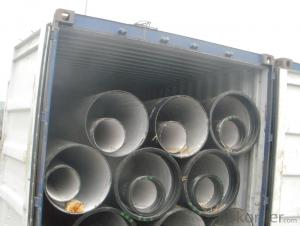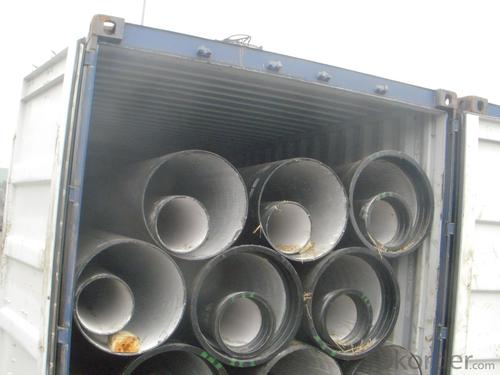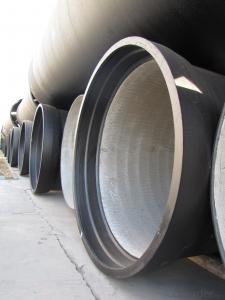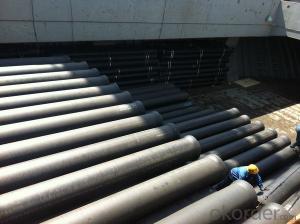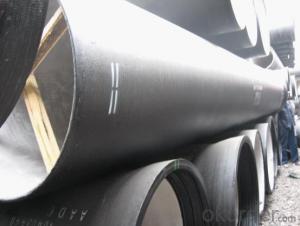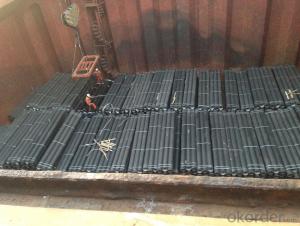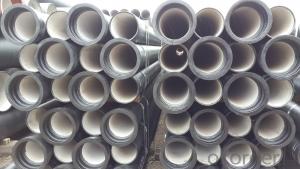T Type Ductile Iron Pipe K CLASS DN1600 socket spigot pipe
- Loading Port:
- Tianjin
- Payment Terms:
- TT OR LC
- Min Order Qty:
- 25 m
- Supply Capability:
- 30000 m/month
OKorder Service Pledge
OKorder Financial Service
You Might Also Like
1) The standard of pipe: ISO2531:1998, EN545:2006,K9 K8
2) Effective length: 6m/5.7m
3) Inner cement line: Portland cement lineas per ISO4179
4) Zinc coating: at least 130g/m2 as per ISO8179
5) Bitumen painting: at least 70μm as per ISO8179
6)With 102% quantity of NBR, SBR, or EPDM ring asper ISO4633
7) DN80-DN1200
8) Highstrength, lighter than grey iron, good corrosion resistance, no furring, smallflow resistance, easy fixing, long life tome about 100 yeas
9)Checked by automatic inspection equipment
10) Composition:
Chemical composition | |||
Chemical composition | Ductile Cast Iron Pipe (%) | Grey iron pipe (%) | Steel pipe (%) |
C | 3.5-4.0 | 3.2-3.8 | 0.1-0.2 |
Si | 1.9-2.6 | 1.4-2.2 | 0.15-0.4 |
Mn | 0.15-0.45 | 0.4-0.6 | 0.3-0.6 |
P | ≤0.06 | ≤0.3 | 0.02-0.03 |
S | ≤0.02 | ≤0.1 | 0.02-0.03 |
Mg | 0.03-0.06 |
|
|
11) Feature:
Mechanical properties | |||
| Ductile Cast Iron Pipe | Grey Iron Pipe | Steel Pipe |
Tensile Strength(Mpa) | ≥420 | 150-260 | ≥400 |
Yield Strength(Mpa) | ≥300 | No Confirmation | No Confirmation |
Bending Strength(Mpa) | ≥590 | 200-360 | ≥400 |
Elongation (%) | ≥10 | Neglected | ≥18 |
Brinell Hardness(HBS) | ≤230 | ≤230 | About 140 |
12) T type mechanical joint
13) Packing: in bulk or container
PACKING: 1) Pipesare bundled together with the steel belt.
2) Wooden pieces are put between the pipes.
- Q: How does ductile iron pipe perform in seismic conditions?
- Ductile iron pipe is known for its excellent performance in seismic conditions. It has proven to be a reliable and durable choice for underground water and wastewater systems, especially in areas prone to earthquakes. The inherent strength and flexibility of ductile iron pipe make it highly resistant to seismic forces. It can withstand ground movements and vibrations caused by earthquakes without significant damage or failure. This is due to its unique composition, which includes a high percentage of iron combined with small amounts of carbon and other alloying elements. The ductile iron pipe's ability to absorb and dissipate seismic energy through its inherent flexibility is crucial in seismic conditions. When the ground shifts during an earthquake, the pipe can adjust and deform slightly to accommodate the movement, thus minimizing stress concentrations and the risk of fractures. Moreover, ductile iron pipe has excellent joint integrity, which is vital in seismic conditions. The joints are designed to provide maximum strength and resistance against external forces, including seismic activity. Various joint types, such as push-on, mechanical, and restrained joints, are available to suit different seismic requirements and installation conditions. In addition to its mechanical properties, ductile iron pipe also offers long-term corrosion resistance. It is typically lined with a cement mortar or a protective coating, which acts as a barrier against corrosive elements in the soil or water. This corrosion resistance ensures the pipe's structural integrity and longevity, even in areas with high seismic activity. Overall, ductile iron pipe has a proven track record of performing exceptionally well in seismic conditions. Its strength, flexibility, joint integrity, and corrosion resistance make it a reliable choice for underground infrastructure, providing safe and efficient water and wastewater systems in earthquake-prone regions.
- Q: Can ductile iron pipes be repaired if they are damaged?
- Yes, ductile iron pipes can be repaired if they are damaged. The extent of the damage will determine the type of repair that is needed. In cases where the pipe is cracked or has small holes, a repair clamp or a stainless-steel sleeve can be used to seal the damaged area. These methods provide a temporary fix and allow for the flow of water to continue until a more permanent repair can be made. For more severe damage, such as large cracks or broken sections, a full replacement may be necessary. This involves cutting out the damaged section of the pipe and installing a new piece. This process requires specialized equipment and expertise, but it can effectively restore the functionality of the pipe. It is important to note that the repair of ductile iron pipes should be carried out by trained professionals who have experience in working with this type of material. This ensures that the repairs are done correctly and do not compromise the integrity and safety of the pipeline system. Regular inspection and maintenance of ductile iron pipes can help identify any potential issues early on and prevent extensive damage that may require replacement rather than repair.
- Q: Are ductile iron pipes suitable for installation in areas with high traffic loads?
- Yes, ductile iron pipes are suitable for installation in areas with high traffic loads. Due to their inherent strength and durability, ductile iron pipes can withstand heavy loads and are commonly used in applications where there is significant vehicular traffic.
- Q: What is the ductile cast iron pipe
- Cast iron pipe is called a coiled pipe, one is the mouth, and the other is the flange. It is often used in the joint of the cast iron pipe valve, and is often used in conjunction with the second pipe (plug pipe coil)
- Q: Are ductile iron pipes resistant to hydrogen sulfide corrosion?
- Generally, ductile iron pipes exhibit resistance to hydrogen sulfide corrosion. Ductile iron, a form of cast iron treated with magnesium, results in a material that is both flexible and durable. This treatment considerably improves its resistance to corrosion, including corrosion caused by hydrogen sulfide. The magnesium within the ductile iron creates a protective layer on the surface, preventing the infiltration of hydrogen sulfide and other corrosive substances. Nonetheless, it is important to acknowledge that the resistance of ductile iron pipes to hydrogen sulfide corrosion can still be affected by factors such as the concentration and duration of exposure to the corrosive environment. Hence, it is crucial to implement proper maintenance, regular inspection, and appropriate protective measures to ensure the long-term durability and performance of ductile iron pipes in the presence of hydrogen sulfide.
- Q: Can ductile iron pipe be used for stormwater systems?
- Yes, ductile iron pipe can be used for stormwater systems. Ductile iron pipe is a strong and durable material that is commonly used for various applications, including stormwater systems. It has excellent corrosion resistance, making it suitable for handling stormwater, which often contains debris and chemicals. Ductile iron pipe also has high tensile strength and can withstand heavy loads and pressures, making it a reliable choice for stormwater systems that may experience significant flow rates and occasional surges. Additionally, ductile iron pipe is available in various sizes and configurations, allowing for flexibility and adaptability in designing stormwater systems.
- Q: What are the different types of valves available for ductile iron pipe?
- Ductile iron pipe offers a variety of valve options, each with its own unique purpose and function. Among the most commonly used valves are: 1. Gate Valves: These valves are designed to either fully open or fully close the fluid flow in the pipe. They feature a gate-like mechanism that permits or blocks the passage of fluid depending on the valve's position. 2. Butterfly Valves: Butterfly valves are quarter-turn valves that utilize a circular disc to control the flow. When open, the disc aligns parallel to the flow, resulting in minimal pressure drop. Conversely, when closed, the disc aligns perpendicular to the flow, effectively stopping the fluid. 3. Ball Valves: Ball valves consist of a spherical disc with a central hole, known as a ball. When the valve is open, the ball is positioned to allow fluid to pass through the hole. To close the valve, the ball is rotated to obstruct the flow. 4. Check Valves: Check valves are specifically designed to permit fluid flow in one direction only, preventing backflow. They incorporate a flap or disc that opens when the flow is in the correct direction and closes to halt the flow when reversal occurs. 5. Plug Valves: Plug valves feature a cylindrical or conical plug with a through-hole that can be rotated to regulate the flow. When open, the hole aligns with the pipe, enabling fluid to pass. Closing the valve positions the hole perpendicular to the pipe, blocking the flow. 6. Pressure Reducing Valves: These valves serve the purpose of controlling and reducing the pressure of fluid within the pipe. They employ a mechanism that adjusts the flow area to achieve pressure reduction. 7. Pressure Sustaining Valves: Pressure sustaining valves are utilized to maintain a specific pressure level within the pipe. They automatically adjust the flow area to sustain the desired pressure. 8. Air Release Valves: Air release valves are employed to eliminate trapped air within the pipe. They allow air to escape while preventing fluid leakage. These examples demonstrate the diverse range of valve options available for ductile iron pipe. The selection of a suitable valve depends on factors such as the application, flow requirements, and desired functionality.
- Q: Are ductile iron pipes resistant to frost heave?
- Yes, ductile iron pipes are generally resistant to frost heave due to their strong and flexible nature.
- Q: Are ductile iron pipes suitable for use in seismic areas?
- Yes, ductile iron pipes are suitable for use in seismic areas. Ductile iron has high strength and flexibility, making it resistant to seismic forces. It is able to withstand ground movements and vibrations during earthquakes without significant damage, making it a reliable choice for water and wastewater infrastructure in seismic areas.
- Q: Do ductile iron pipes have inner enamel?
- For fire water and living water supply, low requirement is lined with cement mortar, some high can be lined with epoxy resin, epoxy ceramic lining, as well as cement mortar lining epoxy sealing layer (compromise is the price of blame).
Send your message to us
T Type Ductile Iron Pipe K CLASS DN1600 socket spigot pipe
- Loading Port:
- Tianjin
- Payment Terms:
- TT OR LC
- Min Order Qty:
- 25 m
- Supply Capability:
- 30000 m/month
OKorder Service Pledge
OKorder Financial Service
Similar products
Hot products
Hot Searches
Related keywords
